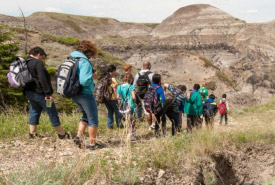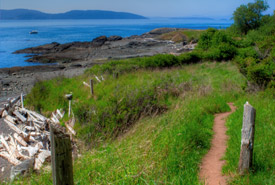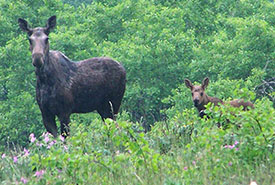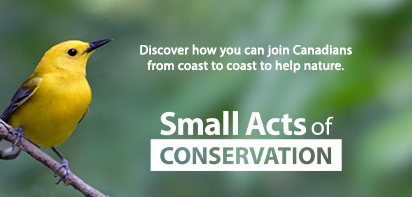Leave no trace

Hiking along Horseshoe Canyon, AB (Photo by Brett Gilmour)
September is upon us and everyone is trying to maximize the rest of this warm weather by spending time outdoors. As we head out to our favourite Nature Destinations or natural areas, we need to be conscious of our surroundings and minimize our impact on the environment.
Over the past few years, hiking and camping have been gaining in popularity among people of all ages. Whether it's taking a peaceful walk in the Prairies or stargazing in the mountains, there is something for everyone to enjoy.
However, increases in outdoor recreational activities have magnified the impact of unsustainable practices, such as littering and the trampling of vegetation. Littering can have devastating effects on wildlife that mistake litter for food, while trampling results in vegetation loss and degrades plant communities.
We can minimize our impact by following the seven leave no trace principles. The Leave No Trace Canada program was created to promote and inform people about the steps they can take to reduce their environmental impact when participating in outdoor recreational activities. These steps include:
- Plan ahead and prepare
To minimize your impact on the environment, plan and prepare before heading out on a trip. This includes hiking in smaller groups and scheduling your trip to avoid peak hours. If you are looking for the perfect conservation site to explore, visit our Connect2Nature website.
- Travel and camp on durable surfaces

Brooks Point coastline trail (Photo by Adam Taylor)
Travel and camp on durable surfaces, such as campsites and hiking trails. Always avoid trampling vegetation by staying on the trail, as it can kill plants and compress the soil. Soil compaction prevents water and essential nutrients from reaching plants’ roots, which prevents it from growing.
- Dispose of waste properly
Always take your food waste with you. If left behind, animals can become dependent on food scraps and display aggression toward humans when deprived. Before leaving a natural area, dispose of your leftover food and place it in a bear-proof garbage bin or take it home with you.
This principle also refers to human waste, which should be buried in a hole 15 to 20 centimeters deep, and soap, which should be biodegradable and scattered well away from bodies or water.
- Leave what you find
Leave behind any plants and animals you encounter on your trip. Non-native species can become invasive and devastate local wildlife by outcompeting them for food and resources.
- Minimize campfire impact
Unattended and improperly extinguished campfires can lead to devastating forest fires. A safer option is to use a camping stove, as it does not leave any trace and reduces the risk of a fire spreading. However, if having a campfire is necessary, keep your fire small and put it out thoroughly before leaving.

Cow and calf moose (Photo by NCC)
- Respect wildlife
Do not approach or feed wildlife. Wild animals can become aggressive and territorial, and getting too close may result in an attack. Feeding wildlife can also lead to serious health issues, as they already have specialized diets. Providing them with the wrong food can eventually lead to malnourishment or death.
- Be considerate of other visitors
Many people visit natural areas to unwind and enjoy the sounds of nature. Be courteous toward other visitors by wearing earphones to avoid disturbing others if you are listening to music. If you want your canine friend to accompany you, make sure they are permitted, and keep your them under control.
By following these simple principles, we can responsibly enjoy the outdoors and help conserve our natural areas. Always remember to take nothing from the wild and to leave nothing behind.




